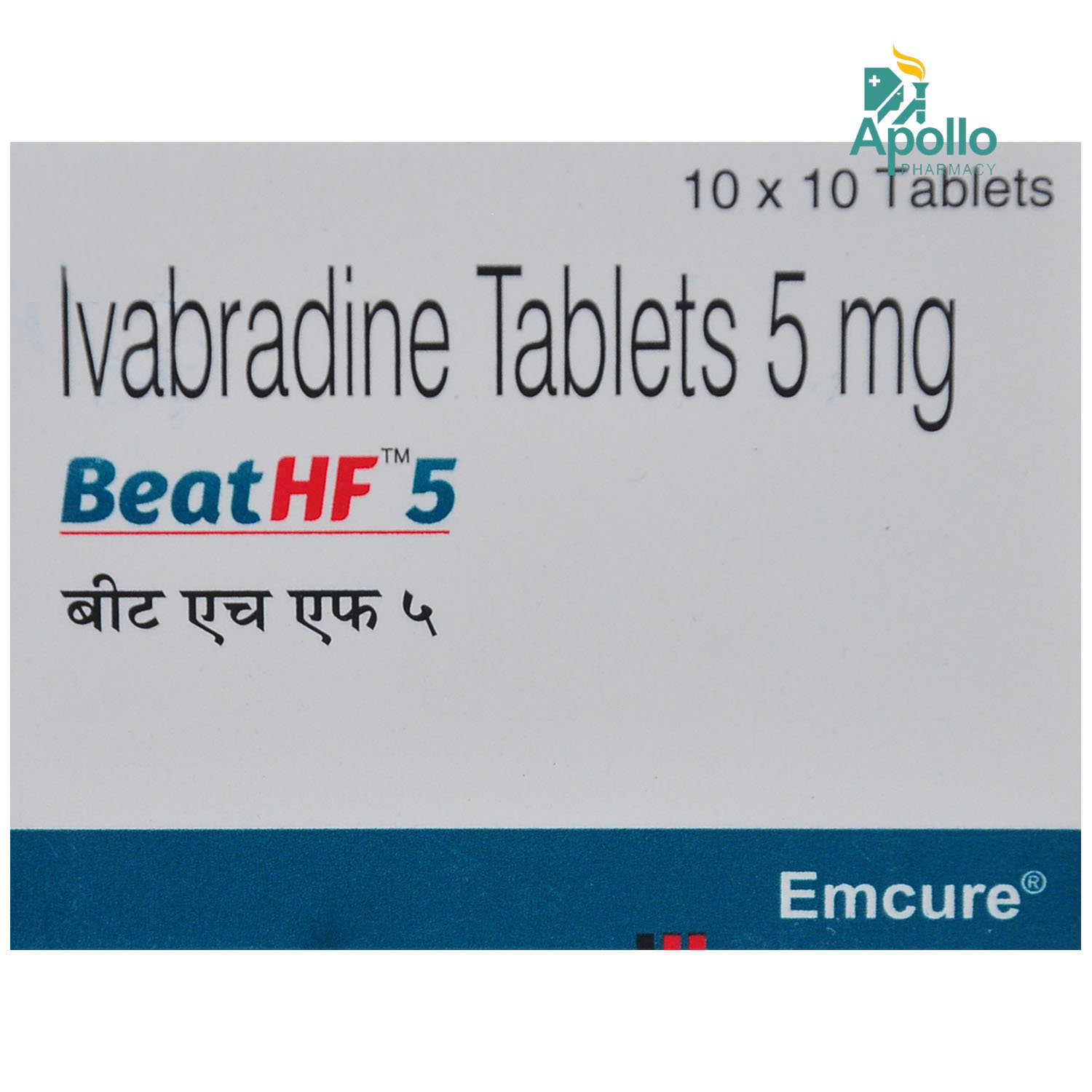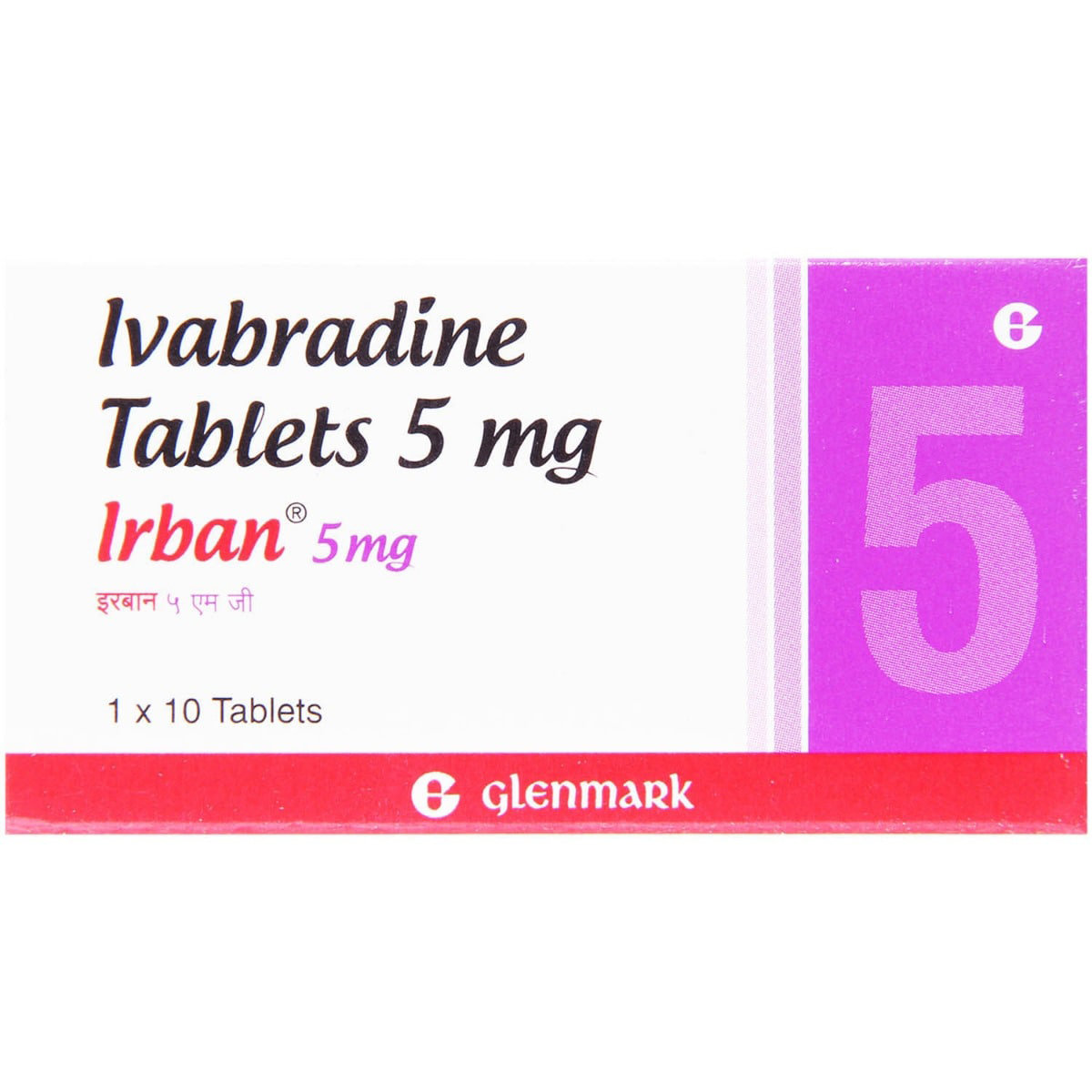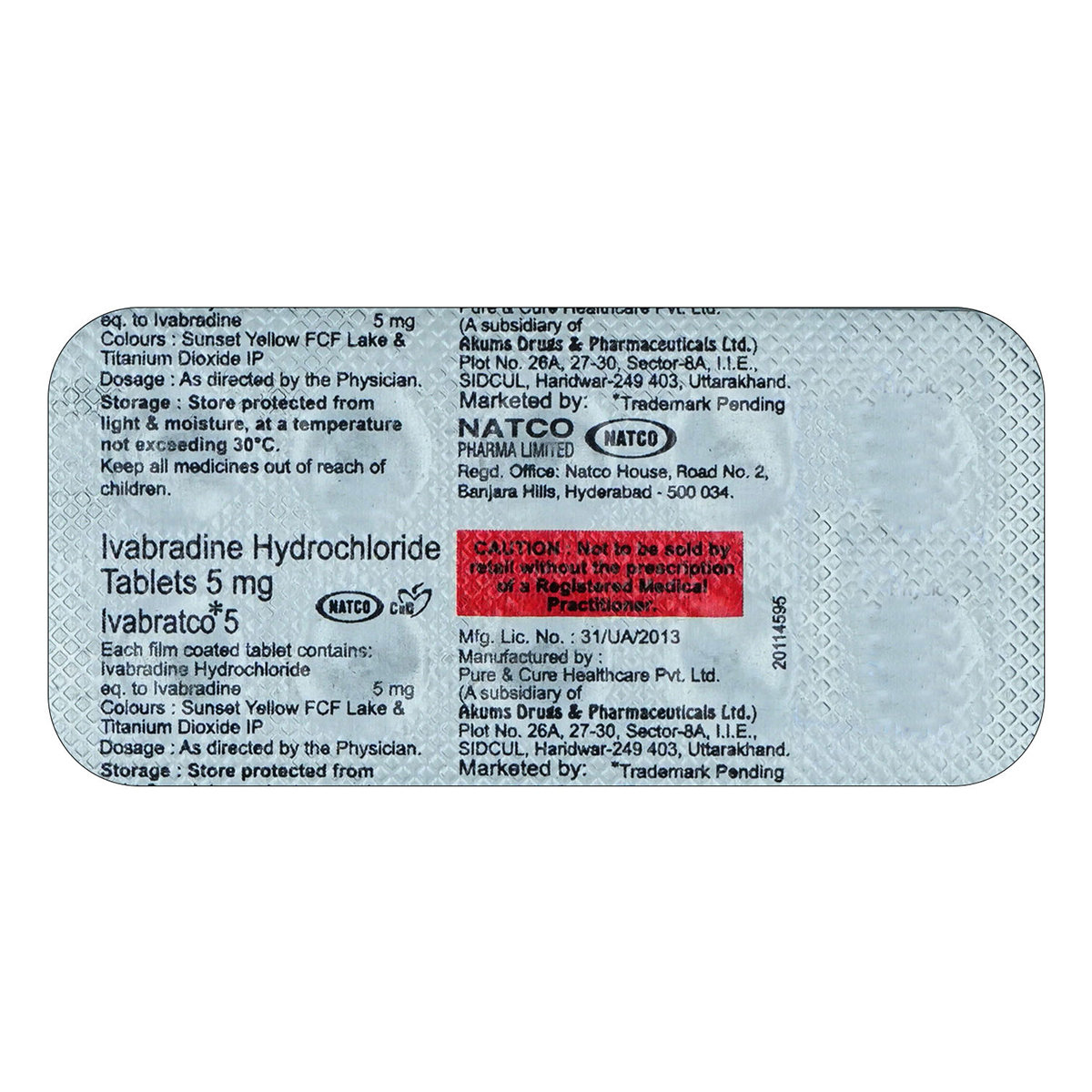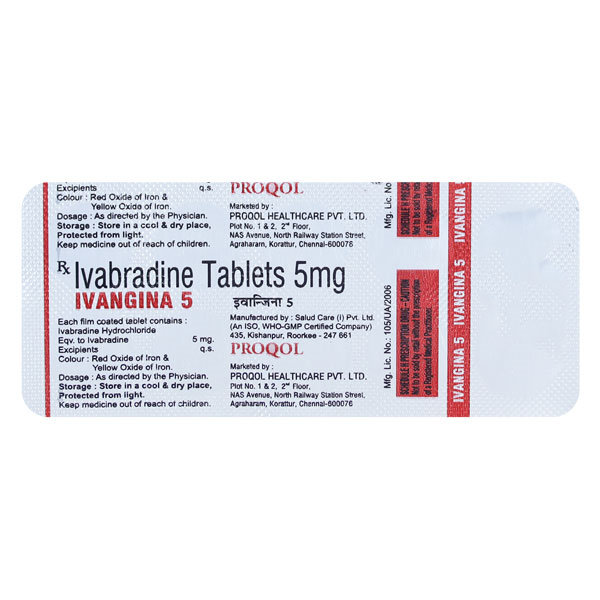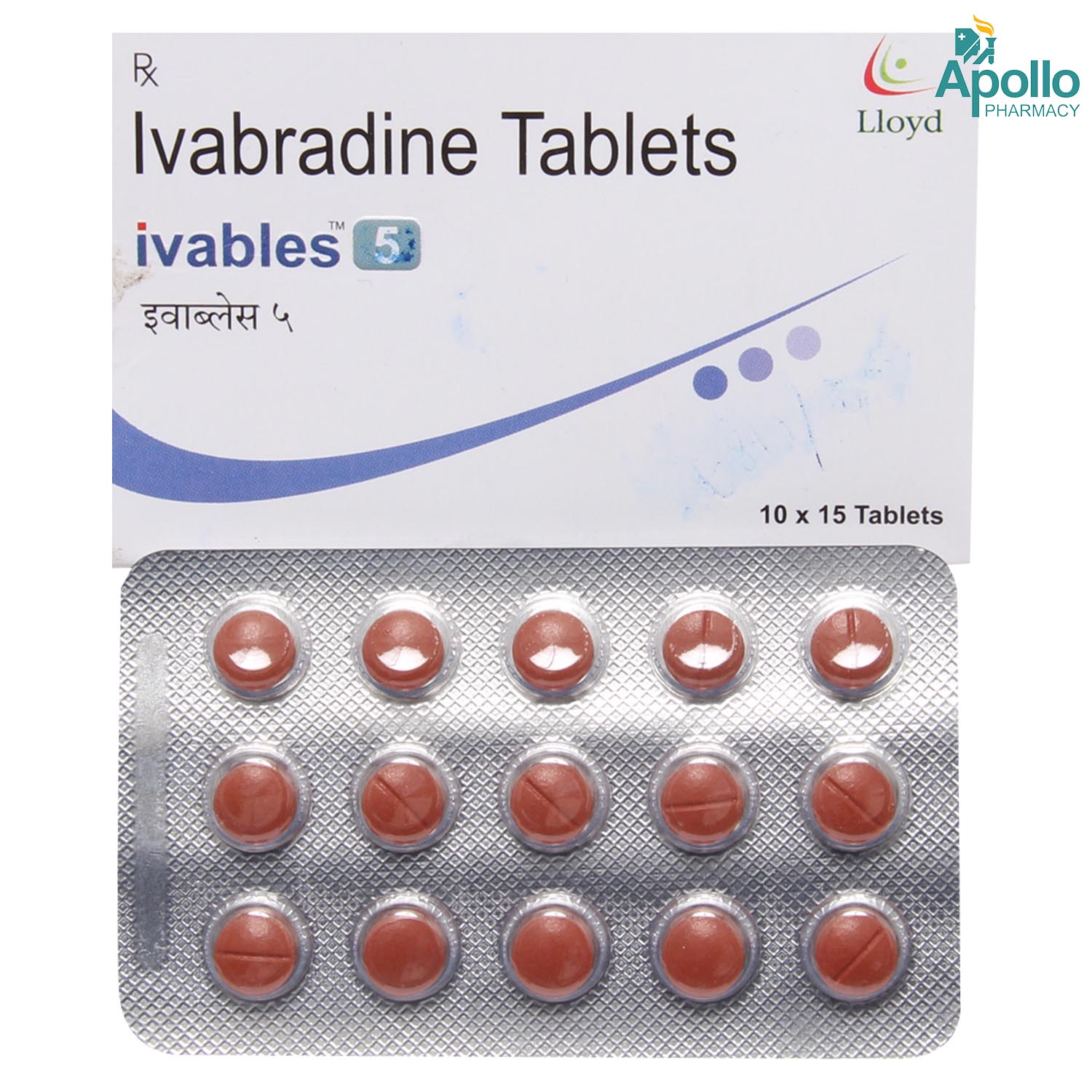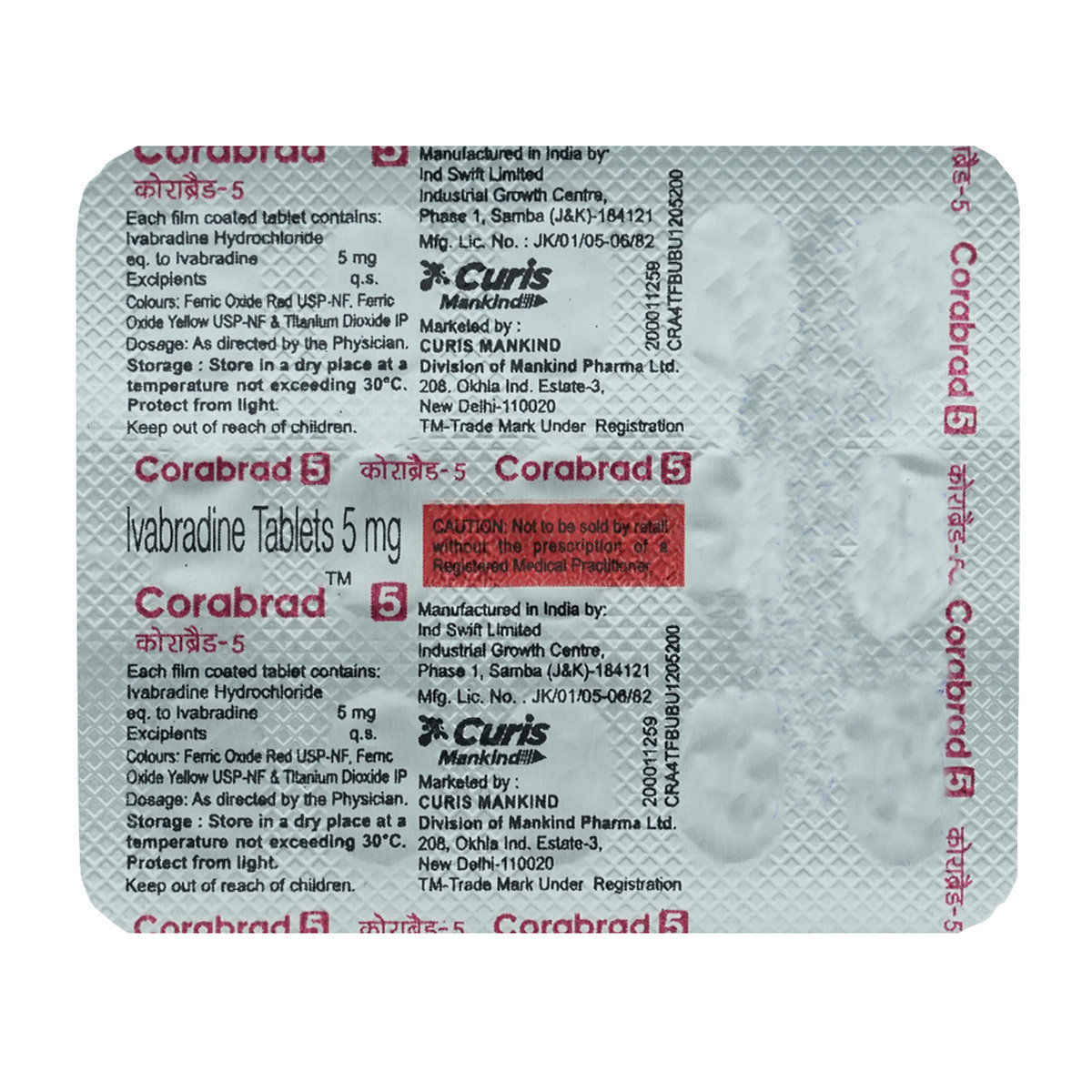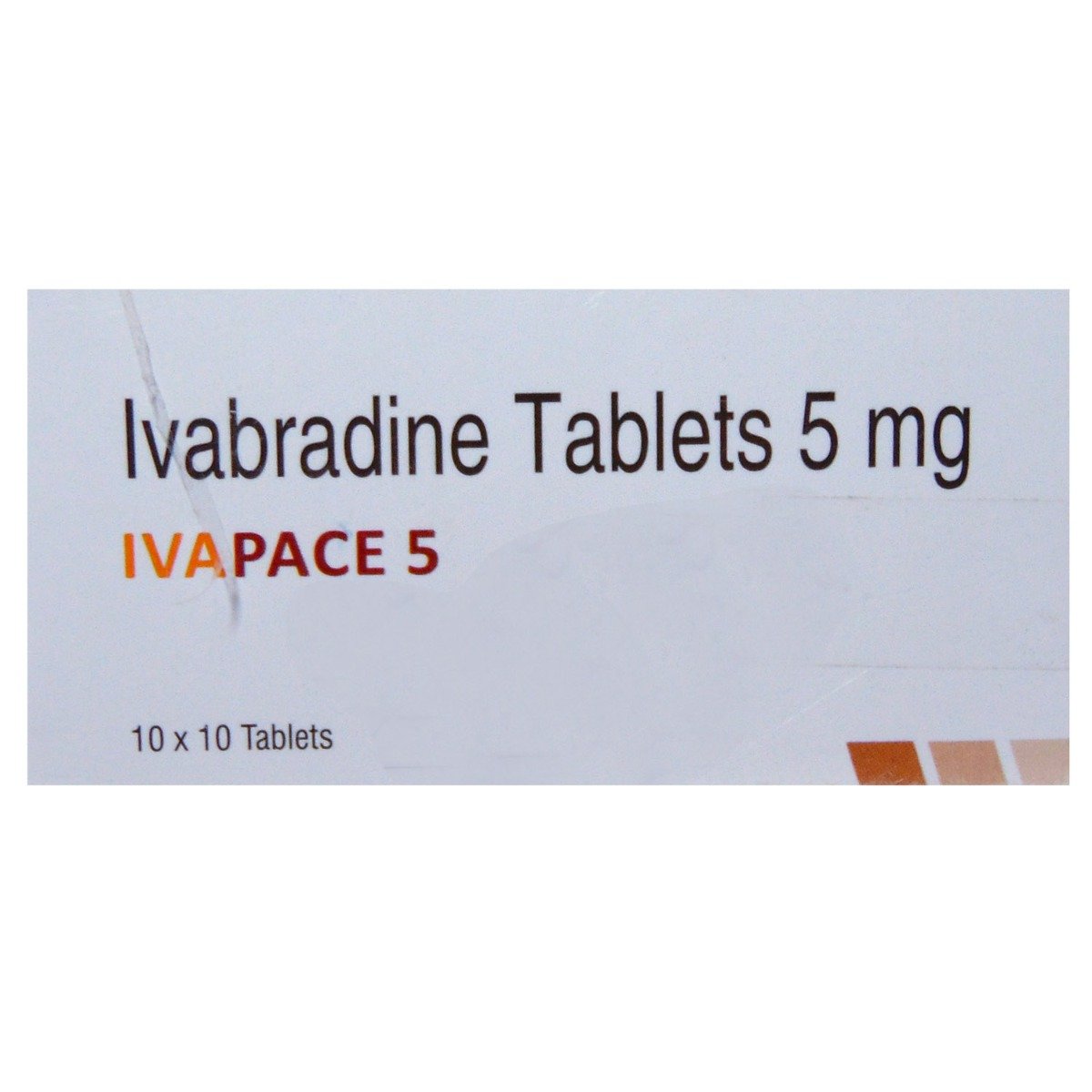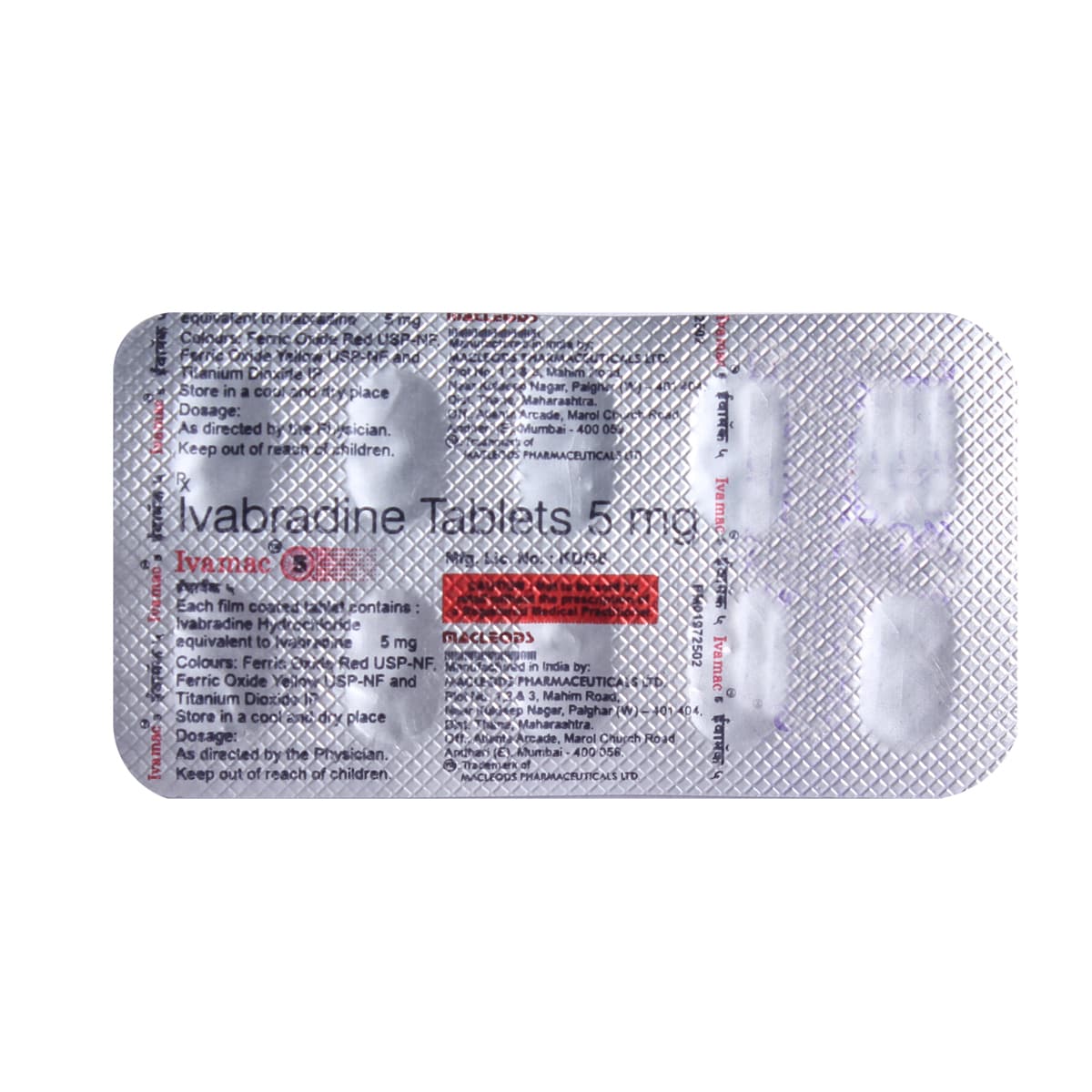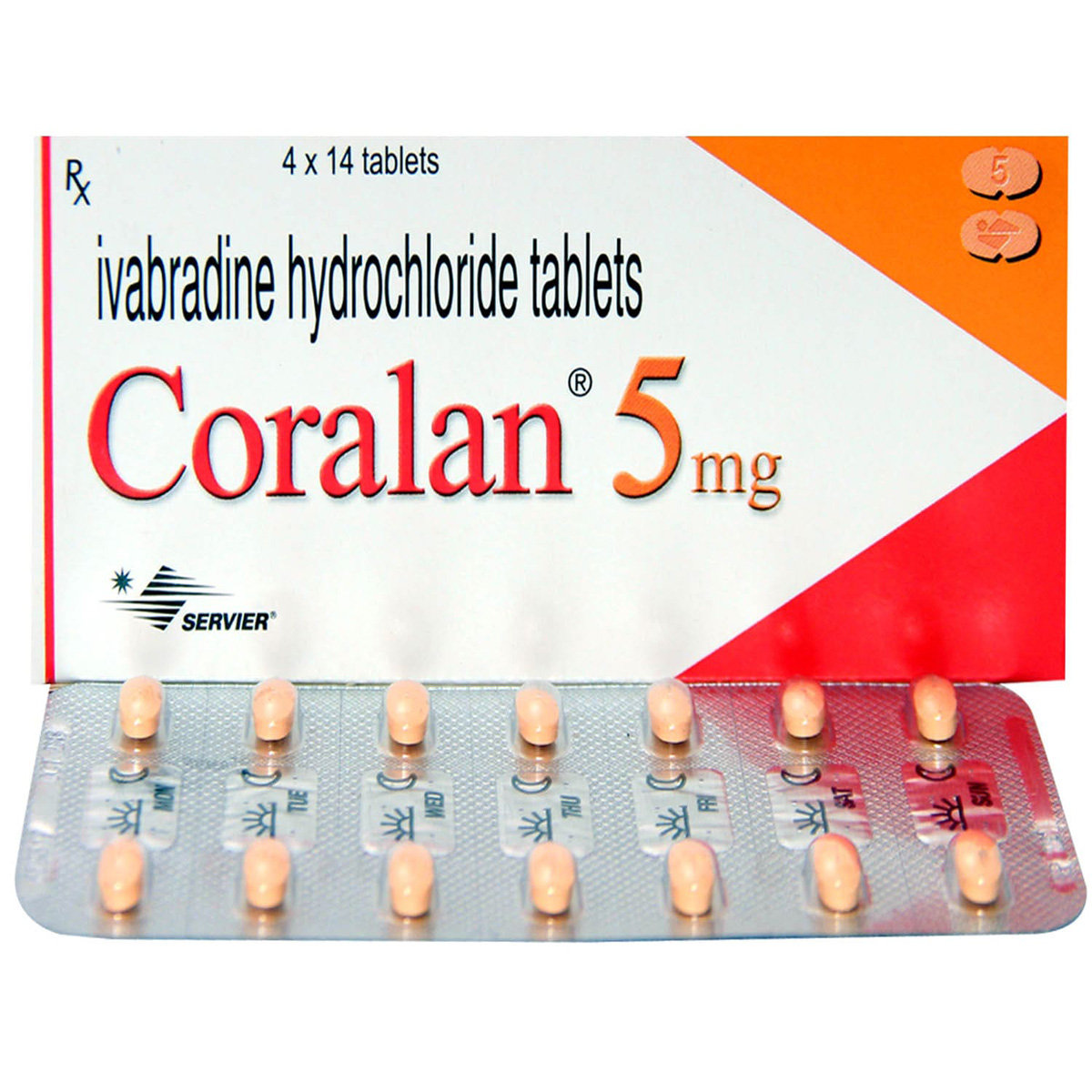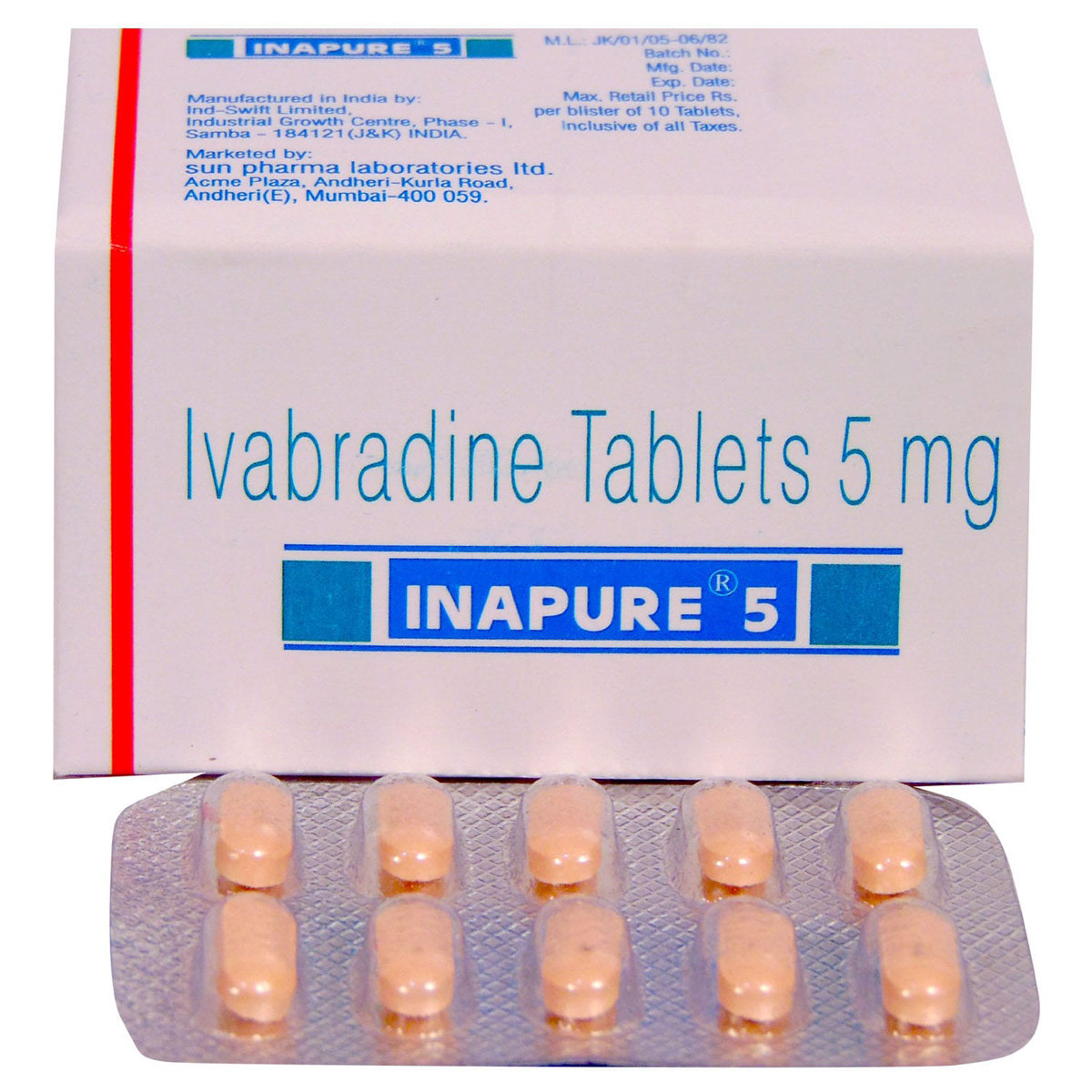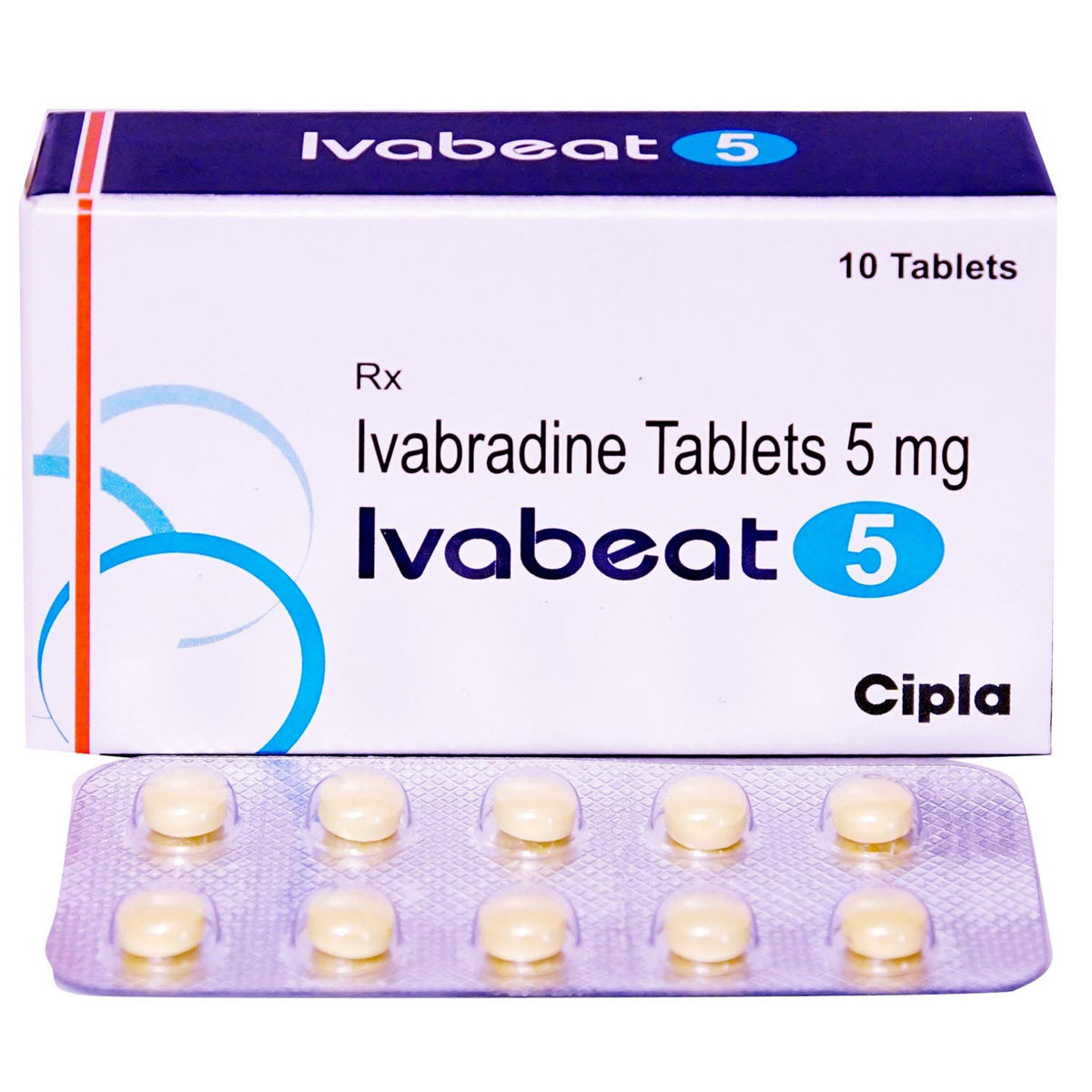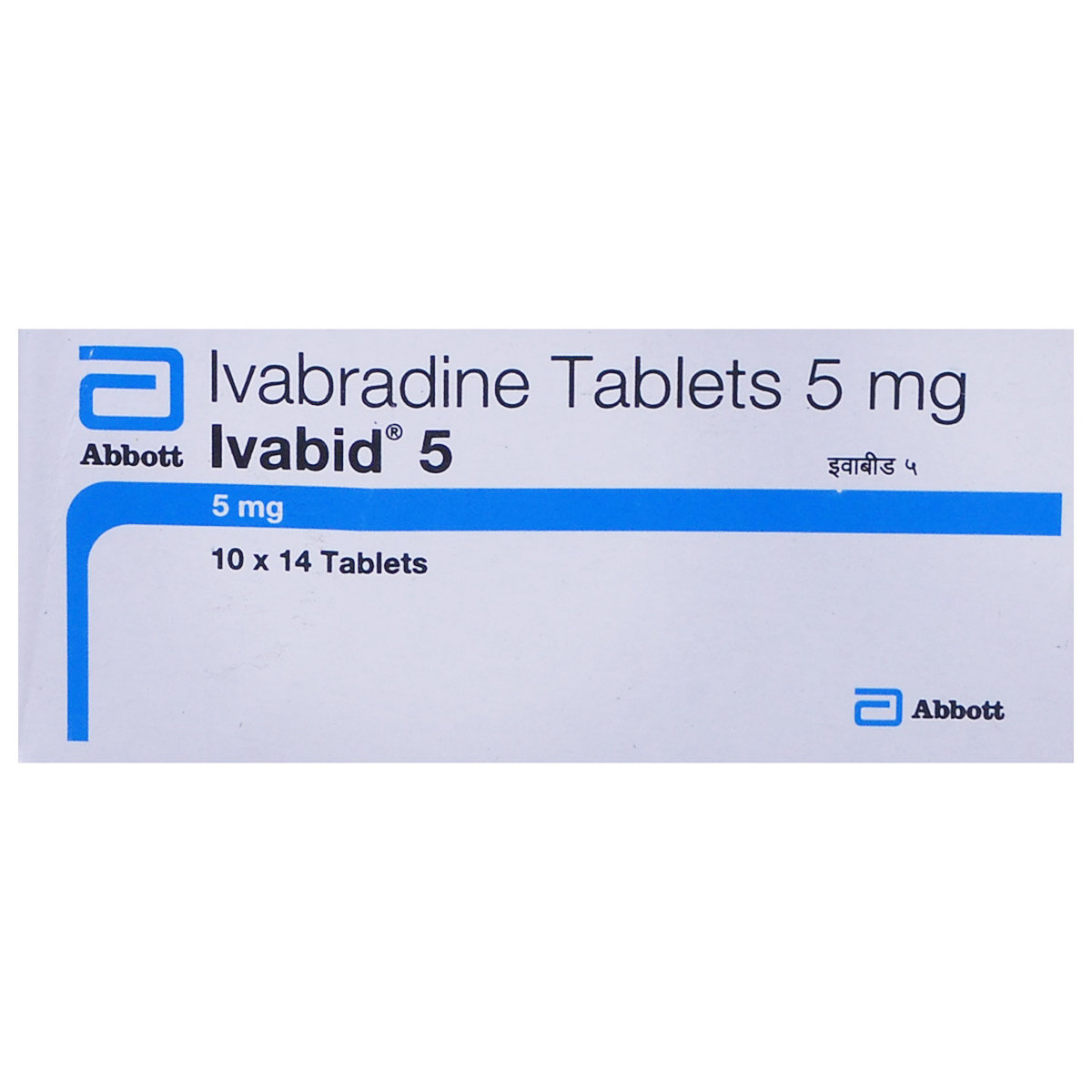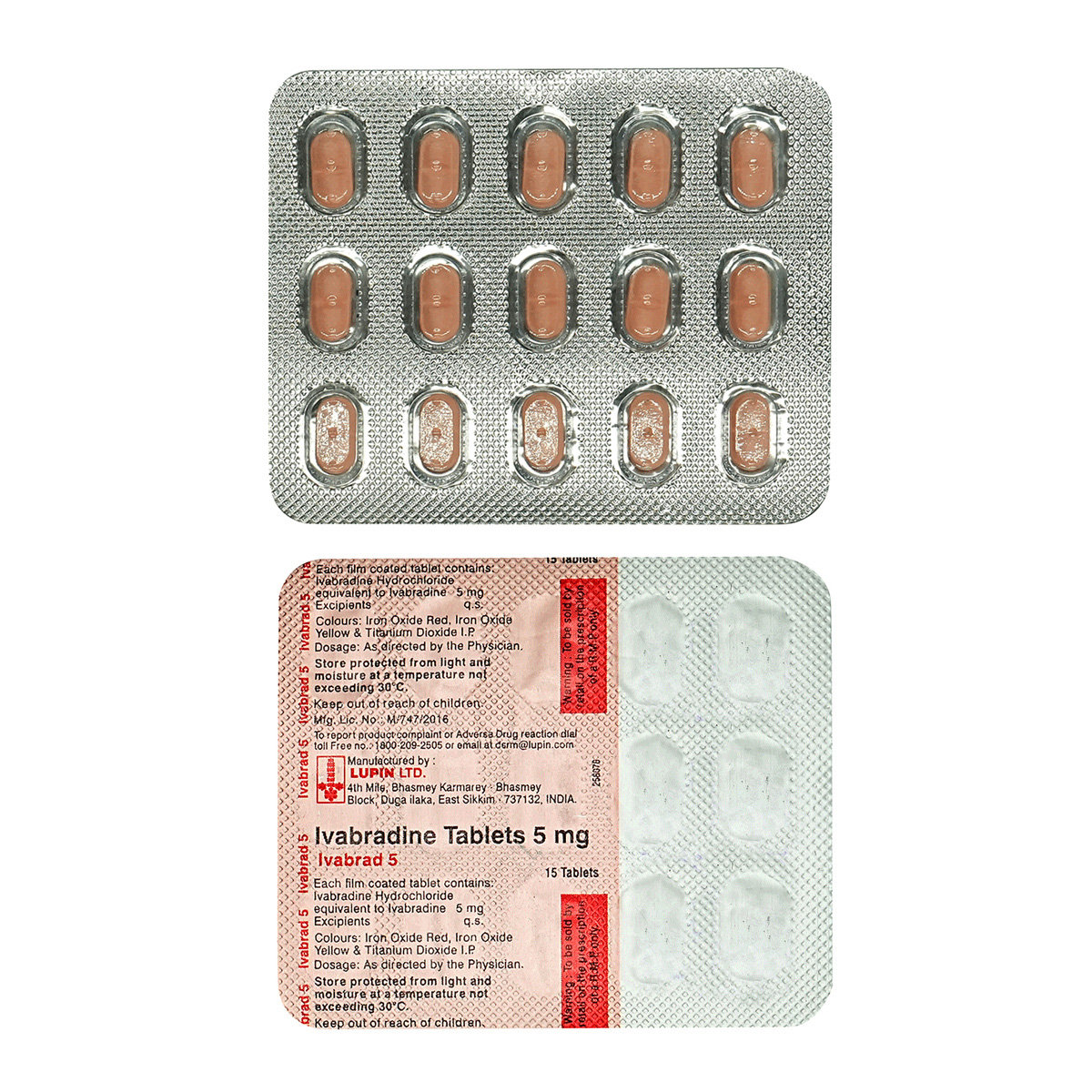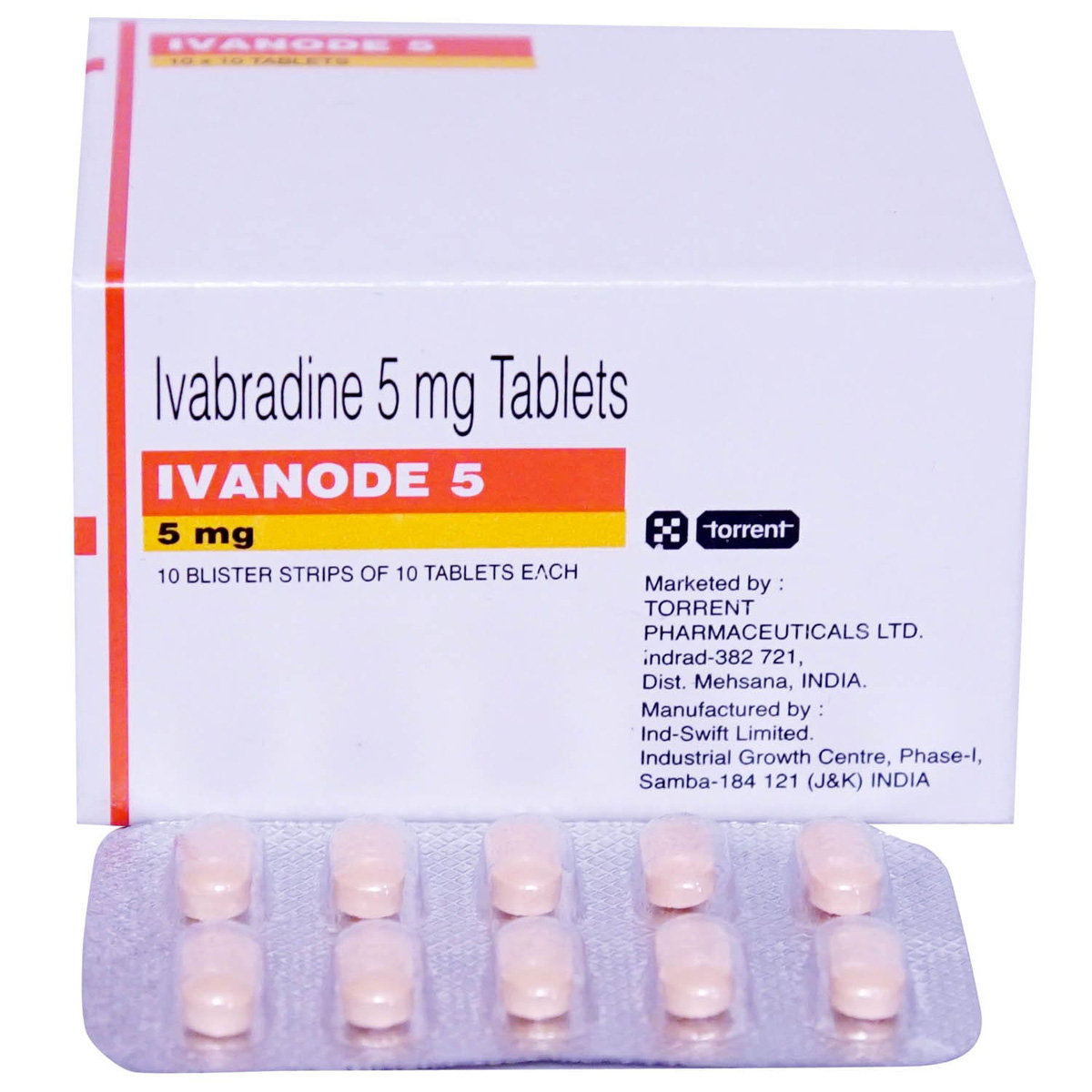Ivacard 5 mg Tablet 10's
MRP ₹165
(Inclusive of all Taxes)
₹24.8 Cashback (15%)
Provide Delivery Location
Online payment accepted
 Prescription drug
Prescription drugWhats That
Composition :
Manufacturer/Marketer :
Consume Type :
Expires on or after :
Return Policy :
About Ivacard 5 mg Tablet
Ivacard 5 mg Tablet belongs to the class of medications, namely hyperpolarization-activated cyclic nucleotide-gated (HCN) channel blockers. It primarily treats symptomatic stable angina pectoris and chronic heart failure. In angina, Ivacard 5 mg Tablet is suggested to adults whose heart rate is over or equal to 70 beats per minute and who cannot take or tolerate heart medicine called beta-blockers. In chronic heart failure, this medicine is suggested with standard therapy for adult patients whose heart rate is over or equal to 75 beats per minute. Angina is a type of chest pain that occurs when the heart does not receive enough oxygenated blood. It is a sign of coronary artery disease and usually happens in people 40-50 years old. Heart failure occurs when muscles in the heart fail to pump enough blood to the whole body, and in turn, the heart fails to function properly. Certain conditions, including narrowed arteries or high blood pressure, may be responsible causes for heart failure.
Ivacard 5 mg Tablet contains Ivabradine, and it works by reducing the heart rate by a few beats per minute. In this way, it lowers the heart's requirement for oxygen, especially in situations where an angina attack can happen. All of this action control or reduce the chances of more angina attacks.
Ivacard 5 mg Tablet should be taken as prescribed by the doctor. Seek medical attention immediately if you notice any sign of an allergic reaction, including hives, swelling of the face, lips, and difficulty breathing. The possible side effects of using Ivacard 5 mg Tablet include feeling tired, irregular or rapid feeling heartbeat, headache, dizziness, visual impairment or blurry vision. Ivacard 5 mg Tablet may increase the brightness of the eyes, especially during the first two months after starting the treatment. These effects will pass with time or after the completion of treatment.
A person dealing with a serious heart condition such as 'sick sinus syndrome is not allowed to take Ivacard 5 mg Tablet . The usage of Ivacard 5 mg Tablet is not allowed in persons who are allergic to any of its constituents or pregnant or breastfeeding females or children below 18 years. Keep your doctor informed about your health condition and all the medicines you are taking before taking this medicine to rule out any side effects.
Uses of Ivacard 5 mg Tablet
Directions for Use
Key Benefits
Ivacard 5 mg Tablet is a heart medicine suggested to treat symptomatic stable angina pectoris and chronic heart failure. Ivacard 5 mg Tablet comes under the hyperpolarization-activated cyclic nucleotide-gated (HCN) channel blockers that slow the heart rate by a few beats per minute so that the heart can pump more oxygenated blood according to the need of the body. Ivacard 5 mg Tablet is responsible for reducing oxygen requirement in conditions where the angina attack may happen. In this way, this medicine controls and reduces the number of angina attacks. Additionally, a high rate could affect the functioning of the heart and may cause serious consequences in patients dealing with chronic heart failure. By reducing the heart rate, this medicine improves the heart's functioning and helps improve chronic heart failure.
Storage
- Exercising regularly helps lower the risk of heart problems.
- Maintain a healthy diet, including vegetables and fruits.
- Rest well; get enough sleep.
- Manage stress with yoga and meditation.
- Limit alcohol and smoking.
- If you experience low blood pressure symptoms like dizziness, lightheadedness, or fainting while taking medication, seek immediate medical attention.
- Make lifestyle modifications and adjust your medication regimen under medical guidance to manage low blood pressure.
- As your doctor advises, regularly check your blood pressure at home. Record your readings to detect any changes and share them with your doctor.
- Fluid intake plays a vital role in managing blood pressure by maintaining blood volume, regulating blood pressure, and supporting blood vessel function. Drinking enough fluids helps prevent dehydration, maintain electrolyte balance, and regulate fluid balance.
- Take regular breaks to sit or lie down if you need to stand for long periods.
- When lying down, elevate your head with extra pillows to help improve blood flow.
- Avoid heavy exercise or strenuous activities that can worsen low blood pressure.
- Wear compression socks as your doctor advises to enhance blood flow, reduce oedema, and control blood pressure.
- If symptoms persist or worsen, or if you have concerns about your condition, seek medical attention for personalized guidance and care.
- Increased creatinine levels must be corrected immediately with the help of a doctor.
- Reduce strenuous activities that can lead to muscle breakdown and production of creatinine.
- Sleep for 7-8 hours per night to assist your body in repairing and rebuilding tissue.
- Manage your blood pressure by implementing changes in lifestyle like losing weight, reducing stress and exercising regularly.
- Avoid smoking and drinking alcohol.
Drug Warnings
One should not take Ivacard 5 mg Tablet if they have pre-existing sick sinus syndrome, liver disease, or have very low blood pressure as Ivacard 5 mg Tablet reduces the heart rate so that heart can pump more effectively. Before taking this medicine, a person should tell their doctor about their pre-existing medical conditions and ongoing medications. Using Ivacard 5 mg Tablet is strictly restricted in pregnant women as this medicine may harm an unborn baby. A woman should use effective birth control pills to avoid chances of pregnancy. A person may face serious heart rhythm problems after taking Ivacard 5 mg Tablet , so if a person notices racing heartbeats, very slow heartbeats, severe dizziness, or tiredness, then they must tell their doctor about it on an immediate basis. The usage of Ivacard 5 mg Tablet is not allowed in children below 18 years of age. Tell your doctor if you have lactose intolerance, as this medicine consists of lactose.
Drug-Drug Interactions
Drug-Drug Interactions
Login/Sign Up
Coadministration of Ivacard 5 mg Tablet with Imatinib can increase the levels of Ivacard 5 mg Tablet in the body. This increases the risk or severity of side effects.
How to manage the interaction:
Taking Ivacard 5 mg Tablet with Bosutinib together is generally avoided as it can result in an interaction, it can be taken if your doctor has advised it. However, contact a doctor immediately if you experience sudden dizziness, lightheadedness, fainting, shortness of breath, chest pain or tightness, rapid heartbeat, or memory loss. Do not discontinue any medications without consulting a doctor.
Using Ivacard 5 mg Tablet together with voriconazole may significantly increase the blood levels and effects of Ivacard 5 mg Tablet.
How to manage the interaction:
Taking Ivacard 5 mg Tablet with Voriconazole together is generally avoided as it can result in an interaction, it can be taken if a doctor has advised it. However, contact a doctor immediately if you experience dizziness, shortness of breath, rapid heartbeat. Do not discontinue any medications without consulting a doctor.
Coadministration of Ivacard 5 mg Tablet with Ketoconazole can increase the risk or severity of side effects.
How to manage the interaction:
Taking Ivacard 5 mg Tablet with Ketoconazole is not recommended as it can result in an interaction, it can be taken if a doctor has advised it. However, if you experience sudden dizziness, lightheadedness, fainting, shortness of breath, chest pain or tightness, rapid heartbeat, or memory loss, contact a doctor immediately. Do not discontinue any medications without consulting a doctor.
Using Ivacard 5 mg Tablet together with posaconazole may significantly increase the blood levels and effects of Ivacard 5 mg Tablet.
How to manage the interaction:
Taking Ivacard 5 mg Tablet with Posaconazole together is generally not recommended as it can result in an interaction, it can be taken if a doctor has advised it. However, contact a doctor immediately if you experience sudden dizziness, lightheadedness, fainting, shortness of breath, chest pain or tightness, rapid heartbeat, or memory loss. Do not discontinue any medications without consulting a doctor.
Coadministration of Ivacard 5 mg Tablet with ceritinib can increase the levels and effects of Ivacard 5 mg Tablet.
How to manage the interaction:
Taking Ivacard 5 mg Tablet with Ceritinib together can result in an interaction, it can be taken if your doctor has advised it. However, if you experience any unusual symptoms contact your doctor immediately. Do not stop using any medications without talking to a doctor.
Coadministration of Ivacard 5 mg Tablet with Doxepin can increase the risk or severity of irregular heart rhythms. The risk increases in patients with a history of heart illness or electrolyte imbalance.
How to manage the interaction:
Taking Ivacard 5 mg Tablet with Doxepin together can result in an interaction, it can be taken if your doctor has advised it. However, if you experience sudden dizziness, lightheadedness, fainting, shortness of breath, chest pain or tightness, rapid heartbeat, or memory loss, contact a doctor immediately. Do not discontinue any medications without consulting a doctor.
Coadministration of Ivacard 5 mg Tablet with Escitalopram can increase the risk or severity of irregular heart rhythms.
How to manage the interaction:
Taking Ivacard 5 mg Tablet with Escitalopram together can result in an interaction, it can be taken if your doctor has advised it. However, contact a doctor immediately if you experience sudden dizziness, lightheadedness, fainting, shortness of breath, chest pain or tightness, rapid heartbeat. Do not discontinue any medications without consulting a doctor.
Coadministration of Ivacard 5 mg Tablet with Norfloxacin can increase the risk or severity of irregular heart rhythms.
How to manage the interaction:
Taking Ivacard 5 mg Tablet with Norfloxacin together can result in an interaction, it can be taken if your doctor has advised it. However, contact a doctor immediately if you experience sudden dizziness, lightheadedness, fainting, shortness of breath, chest pain or tightness, rapid heartbeat, or memory loss. Do not discontinue any medications without consulting a doctor.
Coadministration of Ivacard 5 mg Tablet with Pazopanib can increase the risk or severity of irregular heart rhythms.
How to manage the interaction:
Taking Ivacard 5 mg Tablet with Pazopanib together can result in an interaction, it can be taken if your doctor has advised it. However, contact a doctor immediately if you experience sudden dizziness, lightheadedness, fainting, shortness of breath, chest pain or tightness, rapid heartbeat, or memory loss. Do not discontinue any medications without consulting a doctor.
Co-administration of Bicalutamide and Ivacard 5 mg Tablet together can increase the chance of a serious abnormal heart rhythm.
How to manage the interaction:
Taking Bicalutamide and Ivacard 5 mg Tablet together can result in an interaction, it can be taken if a doctor has advised it. However, if you experience sudden dizziness, lightheadedness, fainting, shortness of breath, or rapid heartbeat, consult a doctor immediately. Do not discontinue any medication without consulting a doctor.
Drug-Food Interactions
Drug-Food Interactions
Login/Sign Up
Diet & Lifestyle Advise
- Create a well-balanced and healthy diet that includes vegetables, fruits, whole grains, legumes, omega-3-rich foods, and lean protein sources.
- Keep your weight under control with a BMI of 19.5-24.9.
- Avoid chronic stress, as it can raise your blood pressure.
- Spend time with your loved ones to cope with stress and practice mindfulness techniques.
- Be mindful of salt; consume no more than 2,300 mg each day.
- Limit or avoid alcohol consumption.
- Quitting smoking is the best strategy to lower the risk of heart disease.
Side Effects of Ivacard 5 mg Tablet
- Feeling tired
- Irregular or rapid feeling heartbeat
- Headache
- Dizziness
- Visual impairment or blurry vision
Habit Forming
Therapeutic Class
All Substitutes & Brand Comparisons
RX
Beat HF 5 Tablet 10's
Emcure Pharmaceuticals Ltd
₹143.5
(₹12.92 per unit)
12% CHEAPERRX
Irban 5 mg Tablet 10's
Glenmark Pharmaceuticals Ltd
₹147
(₹13.23 per unit)
10% CHEAPERRX
Ivabratco 5 Tablet 10's
Natco Pharma Ltd
₹149.5
(₹13.46 per unit)
9% CHEAPER
Drug-Diseases Interactions
Drug-Diseases Interactions
Login/Sign Up
FAQs
Drug-Drug Interactions Checker List
- LORAZEPAM
- DIPHENHYDRAMINE
- DULOXETINE
- FUROSEMIDE
- PREGABALIN
- ACETAMINOPHEN
- MONTELUKAST
Special Advise
- Angina symptoms can be brought down by including more physical activity and a healthy diet in daily life, so consider the same.
Disease/Condition Glossary
Stable angina pectoris: This is the symptom of coronary artery disease in which a person faces serious chest pain caused by reduced blood flow to the heart. This disease usually happens when the heart is beating at a faster rate than normal to supply more oxygenated blood to the whole body. People dealing with angina may feel pressure, heaviness, and tightness in their chest. It is hard to differentiate angina from other types of chest pain, such as pain due to indigestion. If a person faces unexplained chest pain, they must seek medical help immediately.
Chronic Heart failure: Chronic Heart failure is also known as congestive heart failure, which happens when the heart fails to pump blood as much as it should. The possible factors include narrowed arteries in the heart, high blood pressure that weaken the heart, and the heart does not pump properly. The possible signs of heart failure include fatigue, rapid heartbeat, increased urge to urinate, rapid weight gain, severe shortness of breath, etc.

Have a query?
Alcohol
Safe if prescribed
A person taking Ivacard 5 mg Tablet is not allowed to consume alcohol as alcohol may worsen the dizziness.
Pregnancy
Consult your doctor
Ivacard 5 mg Tablet is not allowed to be used during pregnancy as it may harm an unborn baby or even can cause premature childbirth. Take effective birth control pills and other contraception methods to avoid the chances of pregnancy.
Breast Feeding
Consult your doctor
Women taking Ivacard 5 mg Tablet should not breastfeed their children as it may pass into breast milk to newborns.
Driving
Safe if prescribed
A person taking Ivacard 5 mg Tablet is not allowed to drive or not to operate any machine, especially at night, as this medicine may cause sudden variation in the brightness of the light.
Liver
Consult your doctor
Ivacard 5 mg Tablet is not allowed to use in patients with severe preexisting liver disease. However, this medication only is used in patients with liver disease if prescribed by the doctor.
Kidney
Consult your doctor
Take Ivacard 5 mg Tablet is not allowed to use in patients dealing with severe renal disease. Ivacard 5 mg Tablet does not interfere with the functions of kidneys in cardiac heart failure patients, but still, this medicine can only be used after the doctor's recommendation.
Children
Safe if prescribed
Ivacard 5 mg Tablet is not allowed to use in children below 18 years unless prescribed by the doctor.




